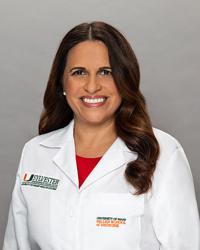Nonsmokers are at Risk for Lung Cancer, Too

Lung cancer takes more lives than any other type of (non-skin) cancer—among both men and women. It’s not surprising that the majority of these cases are smokers and former smokers. But, an alarming number of adults who have never smoked tobacco are diagnosed with lung cancer every year.
Researchers estimate that as much as 20% of lung cancer deaths are among never-smokers with no known risk factors. “Roughly 30,000 people who die from lung cancer in the United States every year have never smoked or used any form of tobacco, according to the American Cancer Society,” says Estelamari Rodriguez, M.D., a thoracic oncologist at Sylvester Comprehensive Cancer Center, part of the University of Miami Health System. These findings reflect changing trends among never-smokers around the world.
What else causes lung cancer?
While tobacco smoking (cigarette, cigar, and pipe) is by far the number one cause of lung cancer, other risk factors include a family history of lung cancer, a diagnosis of chronic obstructive pulmonary disease, gene mutations in the lung cells that can lead to abnormal cell growth, and exposure to certain chemicals.
Dangerous chemical exposures at home and work include:
- secondhand tobacco smoke
- radon gas (learn about at-home radon testing)
- asbestos
- arsenic
- uranium
- some kinds of silica
- chromium
- diesel exhaust
- air pollution
Symptoms of the early stages of lung cancer can include:
- cough that does not go away or worsens
- shortness of breath
- wheezing
- coughing up blood or rust-colored phlegm
- chest pain (worse with deep breathing, coughing, or laughing)
- voice hoarseness
- loss of appetite
- recurrent bronchitis or pneumonia
- neurological symptoms
“Adenocarcinoma is the most common type of lung cancer diagnosed in nonsmokers,” Dr. Rodriguez says. “It often starts in the outer areas of the lungs, in mucus-producing cells that line the small airways.”
The chance that a man will develop lung cancer in his lifetime is about 1 in 15. The American Cancer Society estimates that in 2021, approximately 119,100 men in the U.S. will be diagnosed with the disease.
However, lung cancer incidence rates remained highest among women aged 35 to 54 years compared to men in that same age group between 2015 and 2019. Also, according to the American Lung Association, lung cancer diagnoses have risen a startling 84% among women over the past 42 years while dropping 36% among men over the same period.
But, “both women and men who have not smoked or have a limited smoking history can develop lung cancer,” Dr. Rodriguez says.
Lung cancer symptoms can be different in women.
“One out of every five women with lung cancer has never smoked,” Dr. Rodriguez says. The chance that a woman will develop lung cancer in her lifetime is about 1 in 17. Lung cancer kills more women each year than breast, uterine, and ovarian cancers combined.
Lung cancer can show up earlier in women than in men. “Several international studies have demonstrated that women can gain a higher survival benefit from screening than men by identifying lung cancer at its most curable stage,” says Dr. Rodriguez. “By age 55, many women have already had more than one mammogram, but probably haven’t even considered a lung cancer screening.”
These early symptoms of lung cancer often go ignored or are misdiagnosed among women:
- fatigue
- gradual shortness of breath
- weight loss
- back pain
Should I get screened for lung cancer?
Early detection is critical because smaller cancerous growths are more responsive to treatment. The latest lung cancer screening recommendations (updated in March 2021) have been expanded to include younger patients with a less heavy smoking history.
New lung cancer screening guidelines from the U.S. Preventive Services Task Force:
- ages 50–80
- current smokers
- former smokers who quit within 15 years
- history of smoking at least 20 packs of cigarettes per year
“It is estimated that these new screening guidelines will double the number of people eligible for lung cancer screening,” Dr. Rodriguez says. “It will also potentially increase screening for women and minorities with less smoking history.”
What about screening adults who have never smoked?
“At the 2021 World Conference on Lung Cancer, researchers from Asia presented a large screening trial for never-smokers with high-risk factors, such as family history and environmental exposure,” Dr. Rodriguez says. “To the surprise of many, this trial showed a similar cancer detection rate as trials that focus on high-risk smokers.” While advances like these are promising, lung cancer screenings are not typically made available to never-smokers, and more research is needed to identify how to detect lung cancer early in those with a limited smoking history.
Sylvester’s lung cancer screening program offers low-dose spiral CT scans of the chest as well as multidisciplinary care, from counseling to smoking cessation programs.
“If a suspicious nodule on the lungs is detected early, minimally invasive robotic surgery at Sylvester is curative in the vast majority of cases,” says Nestor Villamizar, M.D., a thoracic surgeon and lung expert at Sylvester. He says suspicious nodules incidentally found on a calcium screening CT scan or CT scan for any other reason should be promptly seen by a thoracic surgeon, even if you don’t have a history of smoking.
“We see far too many patients at our thoracic surgery clinic several months after their initial CT scan reports a suspicious nodule,” Dr. Villamizar says. “We must educate the community about the importance of having surgery as early as possible in these cases. There is clear evidence of decreased survival if surgery if delayed more than 30 days.”
Learn more about your risk of lung cancer.
Visit Sylvester.org/LungScreening or call 305-689-LUNG (5864).
Dana Kantrowitz is a contributing writer for UMiami Health News.
Last reviewed in October 2023 by Dr. Estelamari Rodriguez. She is a triple board-certified hematologist and oncologist at Sylvester Comprehensive Cancer Center, working in a multidisciplinary team of cancer experts.

Originally published on: March 12, 2021
